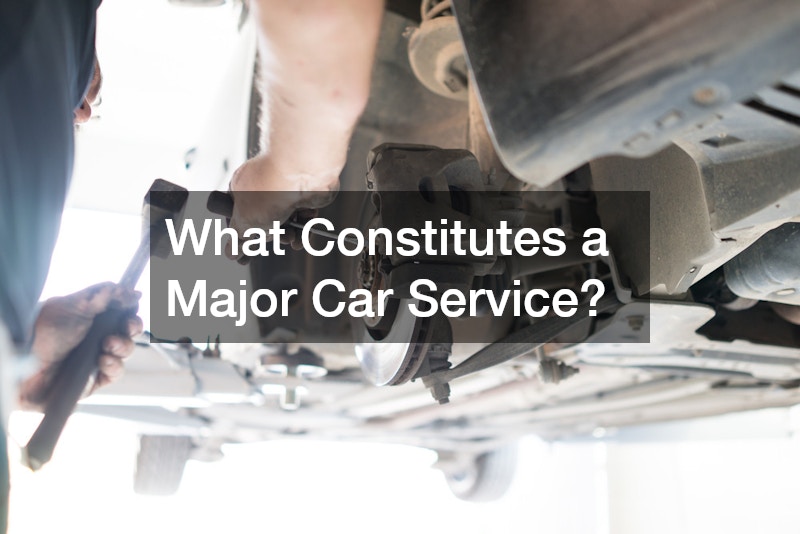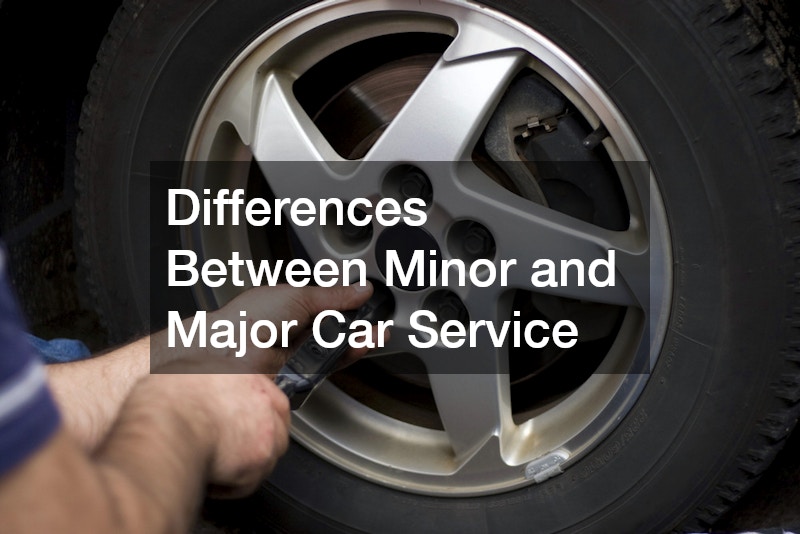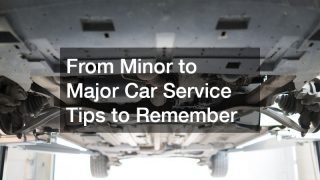
A vehicle is a comprehensive machine requiring consistent attention to maintain optimal performance. Whether it’s a simple tune-up or an extensive overhaul, understanding car service from minor maintenance to major overhauls is essential. A well-maintained vehicle not only serves better in terms of performance but also ensures safety on the road. That is why it is important to know facts and tips from minor to major car service.
This article delves into essential car service tips, ranging from minor maintenance tasks that you can do yourself to significant, more extended services requiring professional expertise. Routine maintenance, such as oil changes, tire rotations, and brake inspections, can prevent small issues from escalating into costly repairs. Additionally, keeping an eye on fluid levels, battery health, and engine efficiency can save time and money in the long run.
By adhering to regular service schedules, you avoid costly damages and enhance the lifespan of your car. Whether it’s just checking your diesel parts or hiring an auto repair service, keeping your car in top-notch condition should be a priority for every car owner. Understanding the difference between DIY maintenance and professional servicing ensures that you’re making the best decisions for your vehicle’s longevity.
What Constitutes a Major Car Service?

A major car service typically includes comprehensive inspections and replacements that go beyond the routine oil change or filter swap. It encompasses a thorough evaluation of the vehicle’s core systems, including brakes, transmission, and engine components. Every auto repair service ensures that during a major car service, parts like spark plugs, brake pads, and belts are meticulously checked and replaced if necessary.
The essence of a major car service lies in its preventative measures. Unlike minor tune-ups, which might be performed more frequently, major services typically address the deeper mechanics of the vehicle. Generally, a major service covers the aspects that aren’t typically checked during minor service sessions, ensuring that the vehicle runs smoothly and efficiently without unexpected breakdowns.
Major car services in general ensure that your vehicle operates at its maximum potential, providing safety and efficiency. They aren’t just about fixing visible issues but rather involve a holistic approach to maintaining the vehicle’s health. With regular major services, the likelihood of costly repairs is significantly reduced while the longevity of the car is enhanced.
How Often Should a Major Car Service Be Conducted?
While the frequency of a major car service may vary depending on the vehicle’s make and model, it’s commonly recommended every 20,000 to 30,000 miles. Auto body shops can provide a detailed schedule tailored to your car’s specifications. They have the expertise to suggest service intervals that might slightly differ based on usage intensity and driving conditions.
Regular consultations with your auto repair service provider help establish the best timeline for maintenance. Regular intervals help to prevent the onset of major issues and maintain vehicle integrity. While some drivers may extend intervals due to costs, it’s usually more economical to protect against future repairs by adhering to recommended service schedules.
Neglecting timely major services can lead to significant malfunctions and more expensive repairs in the future. The benefits of regular major car services include increased vehicle reliability, enhanced safety, and better performance. Ensuring timely servicing typically means fewer surprises on the road and a longer lifespan for your vehicle.
What Are the Signs Your Car Needs a Major Service?
One of the most noticeable signs indicating a need for a major car service is the warning lights on your dashboard. These can signify underlying issues needing immediate attention. Pay attention to any unusual noises, as they often hint at hidden mechanical problems, suggesting it’s time for a professional evaluation by an expert in auto repair services.
Strange sounds such as grinding, squealing, or knocking can often be indicative of potential problems with vital components like brakes or the engine. In such cases, immediate collision repair services are advisable to prevent worsening damage. Additionally, irregular vibrations or difficulty in steering can also signal the imminent necessity for a major service.
If your vehicle starts to manifest performance issues such as stalling, rough start, or increased fuel consumption, it’s a strong indicator for a major service. Timely inspections and maintenance prevent deterioration of your vehicle’s overall health. Addressing these signs early safeguards against costly repairs and ensures your vehicle’s reliability for everyday use.
Differences Between Minor and Major Car Service

Minor car services usually include basic checks and changes such as oil and filter replacements, fluid top-ups, and light inspections. On the contrary, major car services extend beyond these checkpoints and delve into comprehensive assessments and repairs. Hail dent repair may fall under minor services while major services often involve more intricate mechanical adjustments.
A major car service entails a detailed inspection of the entire vehicle, including systems not typically evaluated during routine services. This might encompass an in-depth look at electrical systems, detailed brake checks, and the assessment of steering components. The elaborate nature of a major service addresses potential issues before they escalate.
Despite the differing scopes, both minor and major services are crucial for maintaining your vehicle’s health. Minor services maintain day-to-day performance, while major car services are aimed at ensuring the longevity and reliability of the vehicle. Understanding the importance of both service types helps in planning and implementing a practical maintenance strategy.
What to Expect During a Major Car Service?
During a major car service, a mechanic performs a thorough examination of high-risk systems and components. This generally includes checking the condition of your vehicle’s brakes, engine, and transmission. Utilizing the expertise of local car accident lawyers can help understand the accountability of service providers to ensure vehicles are maintained to prevent accidents.
Technicians might also focus on evaluating suspension components, electrical systems, and safety features. The expectation is a meticulous analysis that investigates current problems while preventing future issues. Alongside this, critical components like timing belts and coolant are inspected for wear and replaced as needed.
In a major car service, drivers should anticipate a deeper dive into vehicle diagnostics. By using advanced diagnostic tools, technicians can spot problems that aren’t readily visible. This guarantees that the car’s overall health is maintained, making future travel safer and more reliable.
How to Choose a Reliable Service Center?
Selecting a reliable service center for a major car service involves researching the company’s reputation and performance. Look for referrals from family, friends, or online reviews to make an informed choice. Companies that offer additional services, such as a tow truck service, often demonstrate a more comprehensive approach and commitment to customer satisfaction.
Checking certification and the quality of the technicians is paramount. Certified professionals in key areas like auto repair services ensure that your vehicle is serviced by skilled and knowledgeable workers. Additionally, a well-equipped service center with up-to-date tools and resources can significantly affect the outcome of a major service.
It is important to select an auto body shop that communicates effectively and provides clear explanations of required services. Transparency in pricing and service requirements builds trust. Trustworthy service centers focus on long-term customer relationships and prioritize the safety and performance of vehicles.
How Much Does a Major Car Service Typically Cost?

The cost of a major car service can vary widely based on factors such as vehicle type, location, and the specific services needed. Generally, you may expect a price range from $200 to $800. It’s essential to remember that each vehicle has unique requirements, which a reliable towing company can verify when discussing potential options.
An accurate cost assessment usually requires an initial diagnostic to detect specific issues. This involves a close examination of any immediate concerns as well as a comprehensive check of fundamental systems. The complexity of the service directly impacts the overall cost, with modern cars sometimes requiring special tools or expertise.
Balancing costs against the necessity of ensuring ongoing vehicle health can be challenging. Opting for timely major car service is an investment into the vehicle’s longevity, possibly saving more money in long-term repairs. Many find doing so reduces the incidence of unexpected breakdowns and enhances everyday reliability.
DIY vs. Professional Major Car Service
While some aspects of car maintenance can be performed at home, major car services are typically best performed by professionals. The complexity of modern engines and the specialized tools often required make professional attention necessary. However, understanding basic elements such as when diesel parts need replacement can ensure effective communication with service providers.
A professional auto repair service introduces expertise that ensures major components of the car are serviced properly. Attempting a DIY approach without adequate knowledge may result in incomplete servicing, potentially leading to further complications. Confidence in the skills of trained automotive technicians ensures thorough maintenance checks and longevity.
For those inclined towards DIY, there are aspects of car care that can be safely managed at home, such as fluid top-ups and tire checks. But when it comes to a full-scale major car service, engaging with a skilled technician is recommended to avoid unintended damage and certificates for work completed.
Importance of Record-Keeping for Major Services
Maintaining a comprehensive record of all major car services contributes to a vehicle’s resale value and ensures continued performance excellence. Detailed documentation allows for informed decisions regarding future maintenance, minimizing redundancy in services conducted by an auto repair service. This practice helps outline routine needs and major overhaul histories efficiently.
Keeping a well-organized log aids buyers with a transparent service history, which can prove beneficial when dealing with a junk car buyer. It establishes the credibility and care the vehicle has received over its life. Consider this record as an asset to both current use and potential resale scenarios.
Having access to past maintenance records streamlines the process of diagnosing new issues. It allows mechanics to track recurring problems swiftly, implementing solutions without repetition. This proactive approach optimizes service time and the overall quality of work conducted on the vehicle.
Future Trends in Major Car Service

As technology advances, so does the field of automotive maintenance. The integration of artificial intelligence and machine learning positions major car services to diagnose and prevent issues more effectively than traditional methods. Innovations such as predictive maintenance will likely revolutionize future repair approaches, drastically enhancing auto repair service experiences.
The role of sustainable practices, such as the use of eco-friendly products, is becoming prevalent in major car services. Moreover, the increased prevalence of electric vehicles requires specialized service knowledge. As these trends evolve, service centers will need to adapt, incorporating new techniques and tools for effective maintenance planning.
Furthermore, demand for mobile services might rise, wherein specialists can travel to customer locations, much like a fleet washing service. This will present an extended convenience to customers, offering flexibility and reducing downtime. These anticipated advancements represent a shift towards more dynamic, accessible, and eco-conscious car maintenance solutions.
Using These Minor and Major Car Service Tips
Regular major car services are vital to the health of your vehicle, promising a reliable and safe driving experience. These services not only help identify potential mechanical issues but also work towards preventing catastrophic failures. Their preventative nature ensures longevity and performance, minimizing the likelihood of sudden expenses related to repair.
Major car services in general necessitate balancing timely interventions and budget considerations, but the long-term benefits far outweigh the costs. They encourage a systematic maintenance approach that reinforces the reliability of a vehicle over time. As a car owner, understanding the importance of professional maintenance and scheduling allows for better planning and peace of mind. Keeping detailed service records also helps maintain warranty coverage and adds value when selling or trading in your vehicle.
Staying vigilant with your car maintenance routine is a commitment to safety, efficiency, and cost-saving in the long run. Embracing these truths about any major car service makes you a responsible vehicle owner, ultimately enhancing the lifespan and resale value of your car. By adhering to these practices, you ensure a properly functioning vehicle, lower risks, and a more pleasurable driving experience. A well-maintained car not only protects your investment but also provides confidence on the road, making every trip smoother and stress-free.



